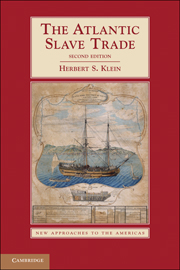Book contents
- Frontmatter
- Contents
- List of Maps, Figures, and Tables
- 1 Major slave-trading zones of western Africa
- 2 Major slave-trading ports of Senegambia and Sierra Leone
- 3 Major slaving ports of the Gold Coast and the Bights of Benin and Biafra
- 4 Major slaving ports of southwestern and southeastern Africa
- Introduction
- 1 Slavery in Western Development
- 2 American Labor Demand
- 3 Africa at the Time of the Atlantic Slave Trade
- 4 The European Organization of the Slave Trade
- 5 The African Organization of the Slave Trade
- 6 The Middle Passage
- 7 Social and Cultural Impact of the Slave Trade on America
- 8 The End of the Slave Trade
- Appendix
- Bibliographic Essay
- Index
2 - American Labor Demand
Published online by Cambridge University Press: 05 June 2012
- Frontmatter
- Contents
- List of Maps, Figures, and Tables
- 1 Major slave-trading zones of western Africa
- 2 Major slave-trading ports of Senegambia and Sierra Leone
- 3 Major slaving ports of the Gold Coast and the Bights of Benin and Biafra
- 4 Major slaving ports of southwestern and southeastern Africa
- Introduction
- 1 Slavery in Western Development
- 2 American Labor Demand
- 3 Africa at the Time of the Atlantic Slave Trade
- 4 The European Organization of the Slave Trade
- 5 The African Organization of the Slave Trade
- 6 The Middle Passage
- 7 Social and Cultural Impact of the Slave Trade on America
- 8 The End of the Slave Trade
- Appendix
- Bibliographic Essay
- Index
Summary
The European conquest of the American hemisphere did not automatically guarantee the expansion of African slave labor to the New World. Africans within Europe and the Atlantic islands were still a relatively minor part of the European labor force, and even sugar production was not totally in the hands of black slaves. At the same time, the existence of at least some 20 to 25 million conquered American Indians presupposed that the Europeans would have an abundant supply of labor available for the exploitation of their new colonies. Europe itself was experiencing major population growth in the sixteenth century, and could probably rely on migrations of its poorer peasants and urban dwellers for its American labor needs. Yet despite these alternative labor supplies, America became the great market for some 9 to 10 million African slaves in the course of the next five centuries, and it was in the New World that African slavery most flourished under European rule.
Before examining the history of the forced African migration to the Americas, it is therefore essential to understand why Europeans turned to Africans to populate their mines, factories, and farms in such numbers. Much has been written of the relative “otherness” of Africans to northern Europeans or the alienness of African culture. But the longterm contact of the Mediterranean with Africans from at least the time of Egyptian civilization onward makes one doubt the importance of this phenomenon.
- Type
- Chapter
- Information
- The Atlantic Slave Trade , pp. 17 - 48Publisher: Cambridge University PressPrint publication year: 2010
- 1
- Cited by



